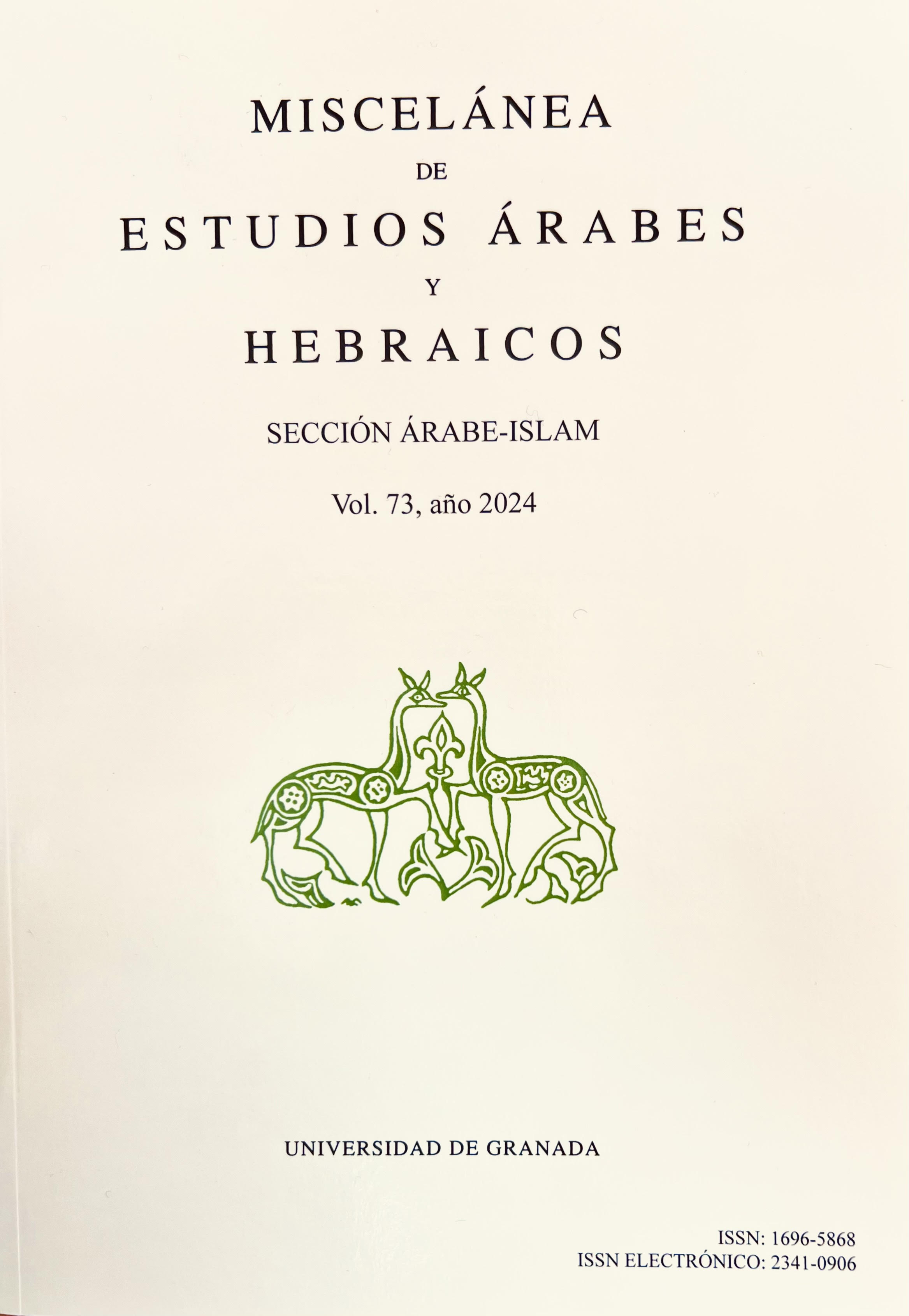Maqāṣid al-Sharī῾a in the Thought of Ṭāhar Ḥaddād and Ibn ῾Āshūr: the Case of Ṭalāq
DOI:
https://doi.org/10.30827/meaharabe.v73.25359Keywords:
Maqāṣid al-sharī῾a. Ṭalāq. Islamic Reformism. Ṭāhar al-Ḥaddād. Ibn ῾ĀshūrAbstract
This paper presents the use of the doctrine of maqāṣid al-sharī῾a in the thought of two Tunisian authors of colonial times, Ṭāhar al-Ḥaddād (1899-1935) and Muḥammad al-Ṭāhir Ibn ῾Āshūr (1879-1973), applying its analysis to the proposals that both scholars made with regards to the institution of ṭalāq (often translated as repudiation). It briefly exposes the origin and development of the theory of maqāṣid, as well as both author’s biography, in order to then compare al-Ḥaddād and Ibn ῾Āshūr’s opinions throughout the study of their main works, which are Imrā’atu-nā fī l-sharī῾a wa-l-mujtama῾ (Our Women in Islamic Law and Society), by al-Ḥaddād, and Tafsīr al-taḥrīr wa-l-tanwīr (Interpretation of Liberation and Enlightment) and Maqāṣid al-sharī῾a al-islāmiyya (The Purposes of Islamic Law), by Ibn ‘Āšūr. The paper concludes that, in both cases, maqāṣid al-sharī῾a was used to sustain reformist readings, but also to justify the persistence of patriarchal practices whose origins can not always be derived literally from the Qur’ān.
Downloads
References
AHMAD, Furqan. “Understanding the Islamic Law of Divorce”. Journal of the Indian Law Institute, 45, 3-4 (2003), pp. 484-508.
AUDA, Jasser. Maqasid al-Shariah as Philosophy of Islamic Law: a System Ap- proach. Londres: International Institute of Islamic Thought, 2008. DOI: https://doi.org/10.2307/j.ctvkc67tg
BORRMANS, Maurice. Statut personnel et famille au Maghreb de 1940 à nos jours. París y La Haya: Mouton, 1977. DOI: https://doi.org/10.1515/ 9783110819526
El Corán. Traducción de Julio Cortés. Barcelona: Herder, 2005.
ESPOSITO, John L. Women in Muslim Family Law. Nueva York: Syracuse UP, 1982.
FIERRO, Maribel. “Al-Shāṭibī”. En Encyclopaedia of Islam, segunda edición. Leiden: Brill, versión en línea consultada el 19/08/2023.
GIMARET, Daniel. “Mu‘tazila”. En Encyclopaedia of Islam, segunda edición. Leiden: Brill. DOI: http://dx.doi.org/10.1163/1573-3912_islam_COM_0822.
HADDAD, Gibril Fouad. “Tropology and Inimitability: Ibn ʿĀshūr’s Theory of Tafsīr in the Ten Prolegomena to al-Tahṛīr wa’l-tanwīr”. Journal of Qur’anic Studies, 21, 1 (2019), pp. 50-111. DOI: https://doi.org/10.3366/jqs.2019.0368
ḤADDĀD, Tāhar al-. Les pensées et autres écrits. Trad. de Noureddine Sraïeb. Oran: C.R.I.D.S.S.H., 1984.
—. Imrā’atu-nā fī l-šarī῾a wa-l-muŷtama῾. Túnez: al-Dār al-Tūnīsiyya li-l-Našr, 1989.
HERNÁNDEZ-JUSTO, Tatiana. “El movimiento obrero como plataforma para la liberación nacional a través de la obra al-‘Ummal al-tūnisiyyūn wa-ẓuhūr al- ḥaraka al-niqābiyya (1927) de Ṭāhar Ḥaddād”. Revista de Estudios Internacionales Mediterráneos, 28 (2020), pp. 74-85. DOI: https://doi.org/10.15366/ reim2020.2
HUSSAIN, Syed Jaffer. “Legal Modernism in Islam: Polygamy and Repudia- tion”. Journal of the Indian Law Institute, 7, 4 (1965), pp. 384-398.
IBN ‘ĀŠŪR, Muḥammad al-Ṭāhir. Tafsīr al-taḥrīr wa al-tanwīr. Túnez: al-Dār al-Tūnisiyya li-l-Našr, 1970.
—. Maqāṣid al-šarī῾a al-islāmiyya. El Cairo y Beirut: Dār al-Kitāb al-Miṣrī y Dār al-Kitāb al-Lubnānī, 2011.
KAMALI, Mohammed Hashim. Principles of Islamic Jurisprudence. Cambridge: Islamic Texts Society, 1991.
LELONG, Michel. “Tahar Haddad et la civilisation du travail”. Institut des Belles Letres Arabes, 25, 1 (1962), pp. 31-48.
NAFI, Basheer M. (ed.). Islamic Thought in the Twentieth Century. Londres: I. B. Tauris, 2004.
—. “Ṭāhir ibn ʿĀshūr: the career and thought of a modern reformist ʿālim, with special reference to his work of tafsīr”. Journal of Qur’anic Studies, 7, 1 (2005), pp. 1-32.
NAVARRO I ORTIZ, E. y LIROLA DELGADO, Jorge. “Al-Šāṭibī, Abū Isḥāq”. En Biblioteca de al-Andalus. Almería: Fundación Ibn Tufayl de Estudios Árabes, 2012, vol. 7, pp. 354-364.
OLMOS ORTEGA, María Elena. “Mujer, matrimonio e Islam”. Anuario de De- recho Eclesiástico del Estado, XXIV (2008), pp. 493-523.
OUALDI, M’hamed. Esclaves et maîtres, les mamelouks des beys de Tunis du XVIIe siècle aux années 1880. París: Éditions de la Sorbonne, 2011. DOI: https://doi.org/10.4000/books.psorbonne.2469
PÉREZ ÁLVAREZ, Salvador. “Las tradiciones islámicas ante el repudio. Su efi- cacia civil en el derecho del estado español”. Ilu. Revista de Ciencias de las Religiones, 13 (2008), pp. 183-223.
PÉREZ BELTRÁN, Carmelo. “Panorámica sobre el status social de la mujer ma- grebí”. Miscelánea de Estudios Árabes y Hebraicos, Sección Árabe-Islam, 40- 41 (1991-1992), pp. 303-335.
QARĀFĪ, Šihāb al-Dīn al-. Nafā’is al-uṣūl fī šarḥ al-maḥṣūl. vol. II. La Meca: Maktabat Nizār Muṣṭafà al-Bāz, 1993.
SCHACHT, Joseph y LAYISH, Aharon. “Ṭalāḳ”. En Encyclopaedia of Islam, segunda edición. Leiden: Brill, versión en línea consultada el 21/11/2020.
Downloads
Published
How to Cite
Issue
Section
License
Copyright (c) 2024 Miscelánea de Estudios Árabes y Hebraicos. Sección Árabe-Islam

This work is licensed under a Creative Commons Attribution 4.0 International License.
The authors publishing their work in this journal agree to the following terms and conditions:
1. The authors retain the copyright and give the journal the right to be the first publication of the work and also to be licensee under a Creative Commons Attribution License which allows others to share the work, provided the author of the work and the initial publication in this journal are acknowledged.
2. Authors may make additional agreements separately for the non-exclusive distribution of the version of the work published in the journal (for example, putting it in an institutional repository or publishing it in a book), with acknowledgement of its initial publication in this journal.
3. Authors are allowed and encouraged to electronically disseminate (for example, in institutional repositories or on their own web page) the published version of their works (publisher's post-print version) or, if not possible, the author's reviewed and accepted post-print version. This is to facilitate productive exchanges, and allow for earlier and greater citation by third parties of the published works (See The Effect of Open Access).
4. The journal accepts no responsibility for the opinions expressed by the authors.















